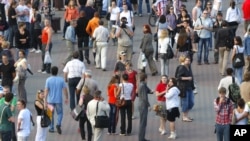The biggest anti-government protest in Belarus in six months flowed out of cyberspace.
Belarus’ protest movement has no leader. It has no address. It relies on the Internet. And it has driven authorities of this former Soviet republic to harsh measures.
On Wednesday night, police snatched 460 people off the streets of nation’s largest cities. Their crime -- clapping hands while walking on sidewalks.
Most were released Thursday after paying fines, although about 20 of them face charges of “petty hooliganism.”
Police also released 16 journalists who had been forced into prison trucks in the sweeps of sidewalks. Sweden complained that police assaulted their charge d’affaires, who was observing the protest in Minsk.
Thousands of young people turned out for the protest -- the third time social networking sites had called for opponents of the government to take a walk on Wednesday evening. It was the biggest turnout since protests last December, after presidential elections widely denounced as fraudulent.
Anatol Lebedko, chairman of the United Citizenship party, called the protest 100-percent successful.
Traditionally, he said, the secret police, still called the KGB in Belarus, arrest protest organizers in advance. Now, there are no leaders to arrest. Anonymous protest calls go out on Facebook and other social networking sites.
Victor Martiovich, editor of the opposition newspaper Belgazeta, agreed, saying that the government does not know what to do. It is facing an amorphous civilian opposition, one with no hierarchy and no leadership.
He said the protesters have created a brand, adding “Now everyone knows where to go if you are against Lukashenko.”
Alexander Lukashenko, Belarus’ president for the last 17 years, threatened last Friday to turn off “that trash, the Internet,” as he put it. Almost half of Belarusian adults are now online, a rate that increases in the cities, where 70 percent of the population now lives.
Already security services now block access to several opposition sites. This week, they interrogated hundreds of Facebook users.
Searching for opponents, the president, a former collective farm manager, promised while on a farm visit last week that he would, in his words, "watch and observe -- and then whack them in such a way, that they won't even have time to run across the border.”
His immediate concern is the country's Independence Day July 3.
Lebedko, the opposition leader, said he would encourage people that day to go for family strolls, to enjoy the fresh air of a summer evening outdoors.
Swelling the ranks of the protest movement is this year's 50-percent devaluation of the Belarusian ruble. While salaries are frozen, inflation is expected to hit 50 percent this year.
On Tuesday, Belarus received $800 million in aid from a Russia-led fund. Thursday, Belarus authorities promised to send some of that money back to Russia to pay an overdue electricity bill to Russia. The Russian power company had threatened to cut off power.
Stanislaw Bogdankevich, former president of the Belarusian National Bank, looks ahead and sees the economic situation getting worse.
With more and more bills coming due, lower living standards are expected to be the new norm for this Central European nation. And that is expected to increase the numbers of illegal hand-clappers.
Belarus Dictator Struggles With Internet-led Protest
- By James Brooke




